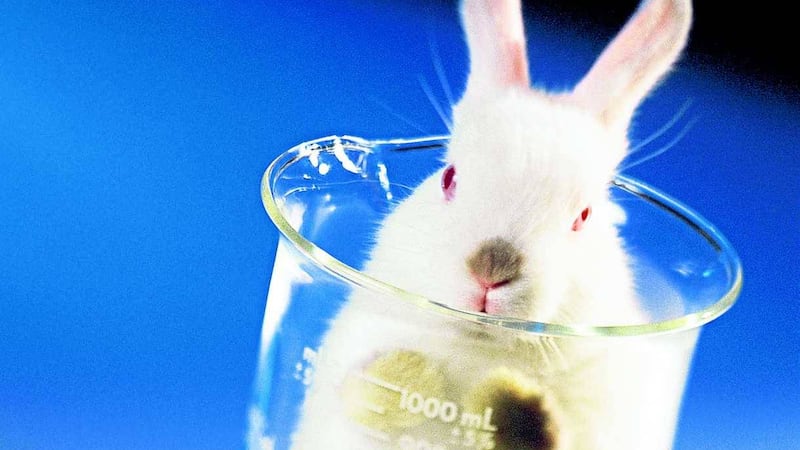ANIMAL rights campaigners have hit out at universities in the north over a "shocking" surge in use of rabbits in lab experiments.
The number of rabbits experimented on by Queen's University Belfast and the University of Ulster has trebled in recent years with almost 150 used in research since 2010.
In total more than 52,000 animals including over 430 guinea pigs, 45,000 mice and 6,000 rats were used for university experiments in the past four years.
And over 50 rabbits were last year subjected to scientific tests - over three times more than the 15 used during 2010.
Head of science at the British Union Against Vivisection (BUAV) Dr Katy Taylor expressed concern over the increasing use of rabbits.
"Members of the public will be particularly shocked by these numbers, especially so for rabbits, a species regarded as a much-loved family pet," she said.
"Universities should be pioneering the use of alternatives and it is disappointing to see such an ongoing reliance on using animals."
However, both universities defended the experiments saying that tests on animals are monitored by strict internal and government regulations.
More than 52,000 animals were used in university experiments between 2010 and 2013, according to figures obtained by The Irish News through Freedom of Information (FOI) requests.
Queen's University accounted for most of the animals at over 47,500 while the University of Ulster experimented on over 5,000 animals, but its figures only covered 2011-13.
Most rabbits were used by Queen's with the University of Ulster carrying out research on only one rabbit.
The number of animals experimented on peaked at over 19,000 during 2012 but dropped to about 13,100 animals in 2013.
Dr Taylor of the BUAV said: "We are disappointed to see that large numbers of animals continue to be used by these leading universities. Despite an overall reduction, we are concerned to learn of an increase in the use of rabbits."
In February the BUAV revealed almost 14,000 animals died in 2012 in experiments at the two universities.
At the time it cited cases including rats forced to inhale lavender oil after using bright lights and noise to raise their anxiety levels.
In another experiment 32 rats were fed pro-biotic supplements, similar to those used in some yoghurts, before being killed and dissected.
Department of Health statistics from 2012 show animals including birds and reptiles were used in more than 18,000 experimental procedures at laboratories across the north. Over two-thirds were carried out in universities.
In 2012 animal rights campaigners condemned a Welsh university for conducting experiments in which kittens' eyes were sewn shut and newborn litters were raised in darkness.
Earlier this year the British Home Office launched plans to reduce the use of animals in research and encourage scientists to use alternatives.
A Queen's spokeswoman said it conducted research on animals only when "absolutely essential for clinical, biomedical and environmental studies and where there are no alternatives".
She said in the last five years only rats, mice and a small number of guinea pigs, rabbits and frogs were used within its Biological Resource Unit for experimentation.
The University of Ulster said all animal experiments were appropriately regulated and closely monitored by staff and government officials.
"All projects affecting animals are subject to ethical review," a spokes-woman said in an FOI response.
"The university actively supports the development, validation and adoption of appropriate alternatives to the use of animals in order to eliminate the need for animal experimentation."
ANIMALS USED IN UNIVERSITY EXPERIMENTS SINCE 2010
QUB UU Total Rats 5,865 379 6,244 Mice 41,148 4,647 45,795 Guinea pigs 431 0 431 Rabbits 143 1 144 Total 47,587 5,027 52,614
(QUB figures for 2010-13, UU figures only available for 2011-13)
* EXPERIMENTS: The north's two main universities, University of Ulster and Queen's University, below, have come under criticism from animal rights campaigners for a rise in the use of rabbits in experiments

